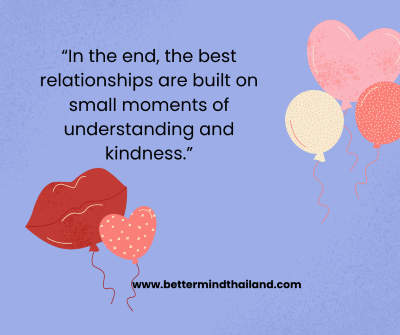How to Care for Your Relationship During Conflict
639 จำนวนผู้เข้าชม |

How to Care for Your Relationship During Conflict

Dr. Marid Kaewchinda (Ph.D)
Expert Counseling Psychologist specializing in EMDR and Brainspotting Therapy
Every relationship faces conflict at some point. Differences in personality, background, and communication styles can easily lead to misunderstandings. The key is not to avoid conflict, but to manage it mindfully — turning arguments into opportunities for growth instead of emotional damage.
1., Pause Before Reacting
When emotions rise, take a deep breath before saying or doing anything. A short pause can prevent long-term regret. Calm yourself first before trying to solve the issue.
2. Listen to Understand, Not to Win
True listening means hearing your partner’s emotions, not just their words. Instead of preparing your next defense, focus on what your partner is really trying to express.
3. Separate the Problem from the Person
Your partner is not the enemy — the issue is. Approach the conflict as a team working together toward a common goal: understanding and healing.
4. Communicate with Respect
Use “I feel…” statements instead of blaming language. For example, say “I feel hurt when you…” rather than “You always make me upset.” This helps both sides stay open instead of defensive.
5. Seek Professional Help When Needed
If conflicts keep repeating or become emotionally exhausting, consider seeing a couple therapist or psychologist. Professional guidance can help both partners communicate better and rebuild emotional safety.
Conflict doesn’t mean your relationship is broken — it’s a chance to grow together. When handled with empathy, patience, and understanding, conflict can actually deepen emotional intimacy between you and your partner.
Even the strongest relationships face conflict. Miscommunication, emotional distance, or stress from work can create tension between partners. But conflict doesn’t mean your relationship is broken — it’s a sign that something needs care and understanding.
With professional support from a relationship psychologist or couple therapist, you can turn conflict into connection, and learn to love each other more deeply.
1. Understand That Conflict Is Normal
Differences in personality, expectations, and communication styles are natural. The goal isn’t to avoid arguments, but to handle them with empathy and mindfulness.
2. Communicate with Emotional Awareness
Replace blame with emotional honesty.
Say: “I feel hurt when you ignore me.” instead of “You never listen.”
Gentle, mindful communication helps both sides feel safe and understood.
3. Build Emotional Safety
Healthy relationships thrive when both partners feel safe to express emotions without fear of judgment or criticism. Listening with empathy can heal emotional wounds more than any words.
4. When Conflicts Keep Repeating — Seek Professional Help
If you find yourselves arguing over the same issues again and again, or if communication keeps breaking down, it may be time to seek couple therapy.

A psychologist can help you:
Identify unhealthy communication patterns
Heal emotional wounds that affect your connection
Rebuild trust and closeness
Learn effective conflict resolution skills
How Better Mind Can Help
At Better Mind, our licensed psychologists specialize in Couple Counseling and EMDR Therapy, helping partners heal emotional pain and rediscover their connection.
We can help if you are experiencing:
- Frequent misunderstandings or emotional distance
- Betrayal or infidelity
- Trust issues
Work or family stress affecting your relationship. Start healing your relationship today.
Your love deserves a chance to grow again — with the right guidance and care.
Conflict isn’t the end — it’s an invitation to grow closer. With understanding, patience, and the right psychological support, your relationship can become stronger and more fulfilling than ever.

Frequently Asked Questions (FAQ)
1. When should couples seek therapy?
If the same arguments keep repeating, or communication feels impossible, therapy can help you reconnect and understand each other better.
2. How long does couple therapy take?
Most couples notice positive changes within 4–8 sessions, depending on the depth of issues.
3. What if my partner refuses to come?
You can start alone. A therapist can help you change your responses and emotional patterns, which can naturally shift the relationship dynamic.
4. Is it normal for couples to argue often?
Yes, occasional arguments are normal. However, if conflicts turn into verbal abuse or constant hostility, it’s important to seek help.
5. What should I do if I don’t feel like talking after a fight?
Take some time to cool down, but make sure to return to the conversation once you’re calm. Avoid ignoring the issue completely.
6. How can a psychologist help with relationship conflicts?
A psychologist can help couples identify unhealthy communication patterns, understand emotional triggers, and teach effective ways to reconnect.







